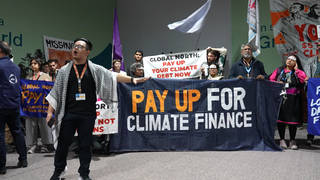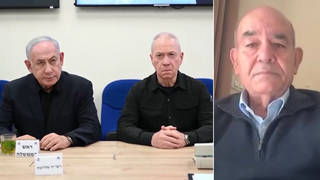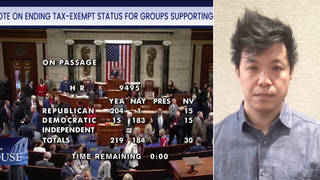HeadlinesJanuary 31, 2020
Senate Poised to Acquit President Trump in Impeachment Trial
The Republican-led Senate appears poised to acquit President Trump as early as today in just the third presidential impeachment trial in U.S. history. On Thursday night, Republican Senator Lamar Alexander of Tennessee announced he would vote against calling witnesses, likely leaving Democrats one vote short. If the vote to call witnesses fails, the Republican leadership is expected to move quickly to end the trial and vote to acquit the president. We’ll have more on the impeachment trial after headlines.
World Health Organization Declares International Public Health Emergency
The World Health Organization has declared an international public health emergency as the death toll from the coronavirus tops 200 in China, with nearly 10,000 additional cases of infection in 20 countries.
Tedros Adhanom Ghebreyesus: “I’m declaring a public health emergency of international concern over the global outbreak of novel coronavirus. Let me be clear: This declaration is not a vote of no confidence in China. On the contrary, WHO continues to have the confidence in China’s capacity to control the outbreak.”
The U.S. State Department is warning Americans not to travel to China, the epicenter of the virus.
U.S. Special Envoy Warns of International Crisis in Idlib, Syria
The U.S. special envoy for Syria James Jeffrey is warning of an international crisis, as nearly three-quarters of a million Syrians have been forced to flee their homes in the northwestern province of Idlib as the Russian-backed Syrian government continues its offensive against the rebel-held territory.
James Jeffrey: “We saw 200 Russian and Syrian regime airstrikes in the last three days, mainly against civilians — as I said, the secretary-general is so alarmed that he’s created a board of inquiry into the attacks on civilians — and massive movements of troops, pushing back hundreds of square kilometers and setting, I think now, 700,000 people, who are already internally displaced, on the move once again towards the Turkish border, which would then create an international crisis.”
Britain Formally Withdrawing from European Union Tonight
Britain is formally withdrawing from the European Union tonight, ending its 47 years of membership in the EU. Tonight’s withdrawal will initiate a nearly year-long transition period, set to expire on December 31, in which the EU and Britain will negotiate the terms of Britain’s future relationship with Europe. Brexit has created massive turmoil in British politics since British voters narrowly approved the country’s departure in a highly polarized 2016 referendum.
Pentagon Deploys 1st Low-Yield Nuclear Warhead-Armed Submarine
The Pentagon has deployed the first submarine armed with a low-yield Trident nuclear warhead in a move that anti-nuclear activists say increases the threat of nuclear war. The USS Tennessee is currently patrolling the Atlantic carrying a nuclear warhead with a third of the explosive power of the atomic bomb the U.S. dropped on Hiroshima.
Trump Admin Poised to Loosen Restrictions on Use of Landmines
The Trump administration is slated to announce today that it is loosening restrictions on the use of landmines, in order to roll back an Obama-era policy that restricted the use of landmines to the Korean Peninsula. The new policy is expected to allow the U.S. to use landmines anywhere in the world. This could make the United States one of only a few countries, including Burma, Syria and North Korea, that would continue to use landmines despite an international treaty banning their use.
Human Rights Groups Condemn Mexico for Crackdown on Central American Migrants
Human rights groups are condemning the Mexican government for its crackdown on Central Americans who travel through Mexico en route to seek asylum in the United States. Mexico has deported over 2,000 Central Americans over the last two weeks and has temporarily suspended all NGOs and faith organizations from accessing detention centers. This is Tania Reneaum of Amnesty International.
Tania Reneaum: “We are talking about the signals that are given that give clear indicators of a migrant policy that does not respect human rights, which also goes with the xenophobic policy of President Trump’s ideology.”
This comes as the Trump administration says it will expand the “Remain in Mexico” policy to Brazilian asylum seekers, who will now be forced to await their U.S. court dates in Mexico. Sixty thousand asylum seekers have already been subjected to the “Remain in Mexico” policy, where Doctors Without Borders says 80% of them report being victims of violence.
Mexican Butterfly Conservationist Found Dead
Mexican butterfly conservationist Homero Gómez González has been found dead, two weeks after he went missing. An official with Michoacán’s human rights commission says he might have been targeted by illegal loggers operating in the area where he managed a sanctuary for monarch butterflies.
Bolivia’s Movement for Socialism Candidate Luis Arce Returns to Bolivia
In Bolivia, massive crowds gathered at the airport earlier this week to welcome the Movement Toward Socialism’s presidential candidate Luis Arce back to Bolivia. He will be running against the far-right self-declared interim President Jeanine Áñez, who sparked massive backlash by announcing she plans run in the May 3 election. The political turmoil in Bolivia comes after longtime President Evo Morales was ousted in a military coup.
U.S. Pushes EU to End Ban on Chemical-Washed Chicken as Part of Trade Deal
The United States is pushing the European Union to end its ban on chemical-washed chicken as part of the negotiations for the transatlantic trade deal, known as the Transatlantic Trade and Investment Partnership. The European Union prohibits the import of chicken products treated with chlorine dioxide. But U.S. Agriculture Secretary Sonny Perdue is pressuring Europe to reconsider this ban, and Trump has threatened to impose tariffs on cars imported from Europe if the EU doesn’t agree to the transatlantic trade deal.
Colorado Poised to Repeal the Death Penalty
The Colorado Senate is expected to vote today on legislation that would repeal the death penalty. On Thursday, senators voted in favor of advancing the measure, with enough Republican lawmakers joining Democrats that the legislation is expected to pass the final vote today. If signed into law, Colorado would join 20 states and the District of Columbia, which have already banned the death penalty.
Saturday Marks 60th Anniversary of Historic Greensboro Four Sit-In
Saturday marks the 60th anniversary of the Greensboro Four sit-in protest at the lunch counter at Woolworth’s in downtown Greensboro, North Carolina. On February 1, 1960, four freshmen students at North Carolina’s A&T State University — Ezell Blair Jr., Franklin McCain, Joseph McNeil and David Richmond — refused to leave the whites-only lunch counter after being denied service. Their action inspired a nationwide wave of sit-ins aimed at desegregating businesses and public spaces. Within weeks of their action, sit-in protests spread to over 250 cities and towns across the country, sparking a nationwide movement that saw more than 400 protests by the end of the year.
Most popular
- 1
- 2
- 3
- 4
Non-commercial news needs your support
Please do your part today.











Media Options